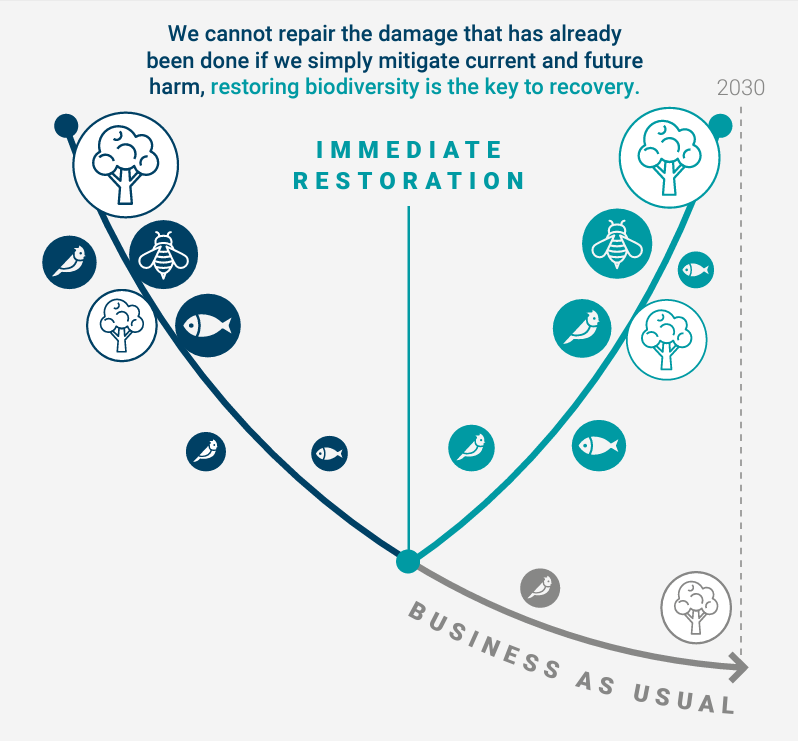NATURE SHARES
Becoming nature positive: Why are businesses investing in nature restoration?
This week, lawmakers in Europe voted to take us one step closer to achieving the targets set out in the Kunming-Montreal Global Biodiversity Framework by placing 20% of the EU’s land and sea areas under restoration by 2030.
Nature is being lost at an unprecedented rate, with the 2022 Living Planet Report revealing that we’ve seen an average species population decline of 69% since 1970. Considering this, policies such at the EU Nature Restoration Bill are more vital than ever – helping us move towards a nature positive future.
What does it mean to be ‘nature positive’?
The Nature Positive Initiative defines ‘nature positive’ as a global goal to “halt and reverse nature loss by 2030 [...] and achieve a full recovery by 2050.” It has been estimated that this will cost us between $700 billion and $1 trillion each year. This means that we urgently need to channel capital towards nature restoration, and that’s where businesses come in.
Each business has the power to help halt further biodiversity loss by taking a look at their supply chain. It can be difficult to get to grips with nature-related impacts, but there are emerging voluntary frameworks, such as the Taskforce on Nature-related Financial Disclosures (TNFD), that have been established to help businesses measure and report on their impacts.
But simply reducing our existing impacts (even if we reduced them to zero) would not be enough to reverse nature loss. We must do something to replace the ecosystems that we have damaged if we are going to have any hope of reaching our key global environmental targets.

Nature-positive policy in action
The newly introduced policy for Biodiversity Net Gain (BNG) in England gives us an example of what ‘nature positive’ can look like in practice. Mandated under the Environment Act 2021, this policy impacts England’s development sector.
BNG policy means that in order to be granted planning permission, developers must be able to compensate for any loss to biodiversity at the site of their development project, plus an additional 10%.
This policy goes beyond previous ‘no net loss’ policies which required developers to compensate for any biodiversity damage caused by their development so that the overall loss was zero. However important in preventing future harm being carried out, ‘no net loss’ does nothing to replace historic damage. Rather than making things better, it merely stops things getting worse.
In the case of BNG, the additional 10% required will have a cumulative effect. We will gradually replace the biodiversity that has been lost already through decades of development – doing more than just balancing the scales to zero.
As a policy, BNG only applies to the impacts of projects carried out by a single sector. But it still has the potential to channel much needed capital into nature recovery on a vast scale. Environment Bank alone has already secured £240m (~$300m) of private investment for nature recovery and 6,500 acres of land to transform into Habitat Banks.
It’s likely that similar global policies will soon follow suit, with BNG serving as a potential blueprint for nature-related compliance policy across a variety of sectors.
What are the benefits of a nature-positive strategy?
We are already seeing businesses participating in voluntary, beyond-value-chain nature restoration activities to reduce their nature-related risks and take advantage of nature-related opportunities. Nature positive strategies are not only beneficial for nature, but they’re part of good business practice overall. When done strategically, they can even increase the business’ natural capital value.
For example, a business could be facing financial pressures resulting from increased flooding in areas adjacent to their primary operations. By investing in nature recovery nearby, they can help restore ecosystems, giving rise to ecosystem services such as natural flood mitigation and improved water quality. Taking actions like these can help to reduce their business’ financial risk.
Equally, a business might sit within an industry that isn’t currently focusing on biodiversity impacts. By taking early action, they can set themselves apart from their competitors and seize the opportunity to become a leading sustainable brand in their sector. By choosing to fund high-integrity projects backed up by robust data, they can avoid greenwashing and instead make demonstrable, nature-positive impacts that can withstand scrutiny.

How can a business become nature positive?
To work towards the Nature Positive Initiative’s vision, a business looking to become nature positive should aim to:
- Measure and report on their nature-related risks and impacts.
- Take steps to reduce these impacts as far as practically possible.
- Compensate for any impacts that cannot be eliminated entirely.
- Proactively invest in projects to restore habitats that have been impacted by their business activities, replacing what has been lost already and supporting global biodiversity goals.
- Find restoration projects that will improve their businesses supply chain, increasing business resilience in the face of climate change.
Of course, none of this is straightforward. But that does not mean that we can afford to wait to take action. As businesses investigate their risks and impacts, they simultaneously need to start investing in restoration as soon as possible.
There’s a place for compliance markets related to policies such as BNG. But there’s also a place for voluntary action. If we focus too much on tying nature-positive actions to the impacts of individual businesses and using nature-restoration to offset specific actions, we risk missing our global targets.
We should never treat nature restorative actions as an excuse to carry out harm, and we have seen this become an issue within the realm of carbon offsetting. There have been cases where corporations have placed far too much emphasis on mitigation rather than impact reduction.
But if we only focus on impact reduction and mitigation, waiting to begin our restoration until we’ve done this, we don’t have any hope of reversing the damage in time to meet our key global targets. We can, and need to, start reversing biodiversity loss immediately.
WEBINAR
Building a nature-positive business strategy: Measuring impacts, reducing risks & taking action
Our panel of ecologists and business sustainability experts from the BBC, Pollination, and Okala will explore the key features of a complete nature-positive strategy – including impact monitoring, risk management, and beyond-supply chain restoration.
We discuss the lessons learned from the carbon marketplace and offer clear actions businesses can take as they embark upon their nature-positive journey – at whatever stage they find themselves.


